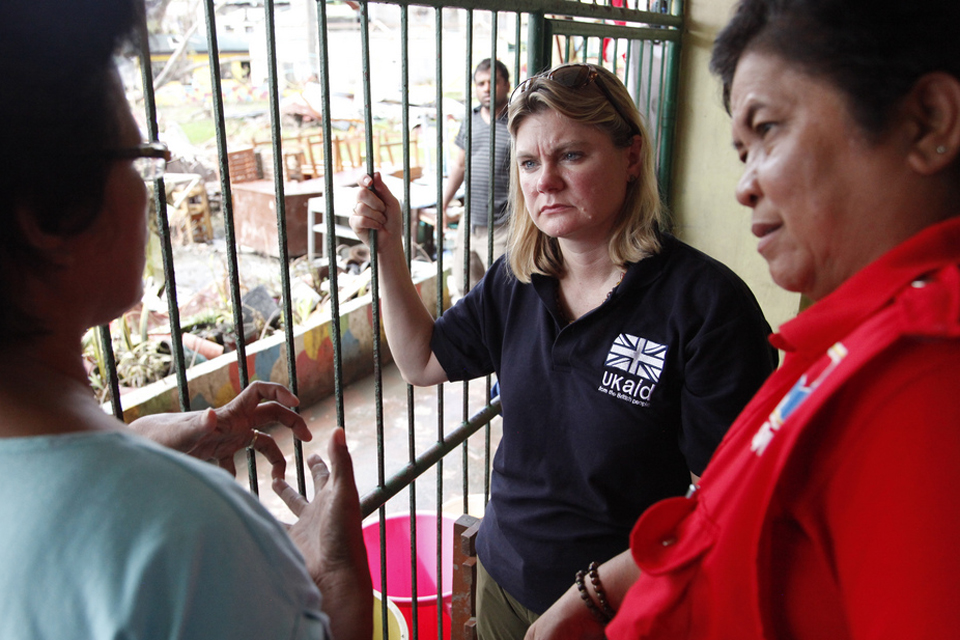Update on the UK's response to Typhoon Haiyan
Oral statement to Parliament by Development Secretary Justine Greening on Britain's support for the Philippines following the super typhoon.

With permission, Mr Speaker, I would like to update the House on the United Kingdom’s response to Typhoon Haiyan. Three weeks after Typhoon Haiyan made landfall in the Philippines, its full effect is becoming clear. The impact has been devastating. As of today, the UN reports that more than 14 million people have been affected, with 3.5 million displaced. The official death toll stands at 5,500.
I visited the Philippines last weekend. The devastation the typhoon has wreaked was clearly evident as I arrived in Tacloban in a RAF C-130 that was carrying a cargo of UK supplies. Many of the outer parts of the town have been flattened and debris from the typhoon litters the streets, but aid is now getting through at scale.
See also
In Tacloban, clearance work is well under way and reconstruction efforts were evident throughout the town, with small businesses getting going again and activity on the streets. The Philippines Health Secretary told me that 90% of health facilities in the affected areas are now operational, although many had suffered damage, but there is still huge need, particularly in the outlying islands and more remote areas. I heard from non-governmental organisations that only 20% to 30% of those people in need of shelter kits had so far received them.
Through our rapid response facility, the UK was one of the first donors to get relief to the worst-affected areas. The UK has so far committed more than £50 million of support, which is helping to get shelter, clean water and emergency supplies to up to 800,000 people. Our logistical support has helped to transform the relief effort. Aircraft handling equipment provided by the UK to unload supplies from planes has doubled the airport capacity at Cebu.
The UK has also extended the reach of our overall humanitarian response through the deployment of the Royal Air Force, HMS Daring and now HMS Illustrious. That military support has been crucial in delivering relief to more remote islands, including the provision of emergency medical assistance through the UK international emergency trauma team.
I pay tribute to the outstanding servicemen and women of the RAF and Royal Navy for their tireless efforts to help those hit by Typhoon Haiyan, and to the NHS personnel who are working to take care of those injured and in need of medical assistance.
I believe that the cross-Government nature of our effort, involving the Ministry of Defence, the Foreign and Commonwealth Office and a range of home Departments, has hugely enhanced our effectiveness, allowing us to combine a range of assets that is greater than any other country’s response.
The British public have shown, and continue to show, overwhelming generosity in response to this crisis, with contributions to the Disasters Emergency Committee appeal now standing at £65 million. It is an incredible display of support to help to maintain the momentum of the relief effort, getting lifesaving supplies to those who need them most.
It is clear that the people of the Philippines face a long road to recovery in the wake of this disaster. During my visit to the Philippines, I met Foreign Minister del Rosario and other members of the Philippines Government, and I gave our commitment that the UK would continue to support their Government as they begin reconstruction and seek further to improve preparedness against future disasters. There is much that the international community can do in support of that goal, and I have already agreed to dedicate £5 million from a regional programme to strengthening the resilience of four Filipino cities to natural disasters.
While in Manila, I met the United Nations, the Asian Development Bank, the World Bank, other donors and NGOs. I heard about their experience of the response so far and discussed with them plans for the longer-term recovery and reconstruction effort. The Government of the Philippines have been clear that they will be leading the reconstruction effort, and the UK will support that work.
I raised my serious concerns about the particular vulnerability of women and girls suffering deprivation, a lack of protection and the threat of abuse and trafficking. I hosted a high-level meeting on this issue with many heads of UN agencies in London on 13 November, when a commitment was made to ensure that protection was a core element of the response. We are working with the Philippines Government, the UN and NGO partners to ensure that this important issue is prioritised, and I have deployed UK specialists in this field to the Philippines to help to ensure that the risks that women and girls face are fully addressed.
The Government of the Philippines expressed their heartfelt thanks to the UK Government and the British public for their response to the typhoon. We should be proud of the generosity of the public, including that of the Filipino community living in the UK, and of our medics and military personnel, and Department for International Development and consular staff, who have worked tirelessly over recent days in the humanitarian effort.
In addition, we should be proud of the efforts of UK NGOs in delivering so much so quickly. This response—the public’s response—truly represents the best of Great Britain. Our thoughts continue to be with the people of the Philippines, particularly those who have lost loved ones. The dire humanitarian situation and the ongoing recovery effort deserve the continued attention and support of this Government, and I commit my Department to leading that effort. I commend the statement to the House.